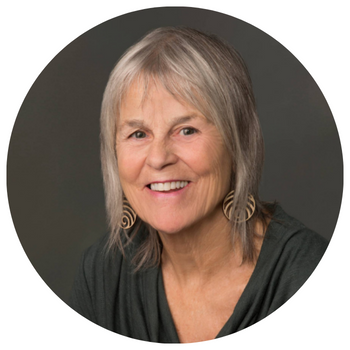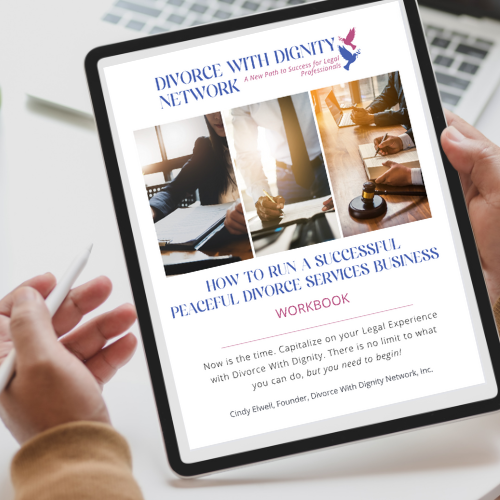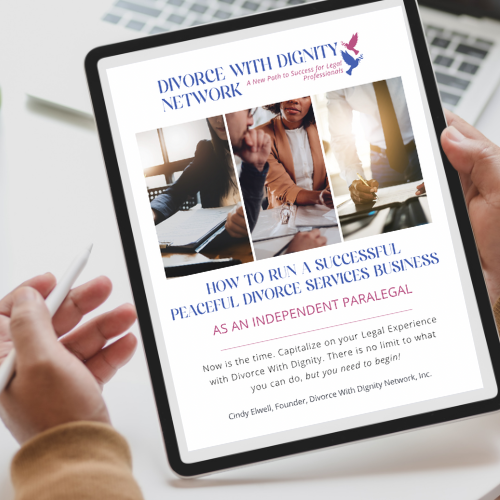In today’s demanding professional world, balancing meaningful work with personal fulfillment can feel like an impossible goal. For those in family law and divorce mediation, the pressure is often even greater. Rigid schedules, emotional burnout, and the inability to prioritize personal well-being can make the field both rewarding and exhausting.
But what if you could structure your career to fit your life—one that offers flexibility, purpose, and the freedom to choose your path? The growing demand for divorce mediation services presents an opportunity to redefine professional success, paving the way for careers that prioritize work-life balance without sacrificing financial stability or personal fulfillment.
The Problem with Traditional Career Models in Family Law
For decades, professionals in family law have been boxed into a rigid framework: long hours, client demands, and the constant pressure to meet deadlines and billable targets. Mediation and divorce services, while offering unique rewards, often come with emotional tolls that leave practitioners drained.
Many professionals in these fields feel trapped, juggling the emotional weight of their work with the demands of a traditional 9-to-5 schedule (or more accurately, an 8-to-8). Whether they’re working for a law firm or running their own practice, the lack of flexibility can create a disconnect between their personal values and their career.
This doesn’t just affect practitioners—it impacts clients too. When providers are overwhelmed, their ability to mediate effectively and empathetically is diminished. The result? Burnout, frustration, and dissatisfaction on both sides.
A Shift Toward Flexibility in Professional Careers
As workplace culture evolves, more professionals are reevaluating what they want from their careers. Flexibility, autonomy, and purpose have become top priorities, especially for those in emotionally charged fields like divorce mediation.
This shift is particularly evident in mediation and legal services, where technology and innovative career models are transforming how professionals approach their work. From remote consultations to customizable client caseloads, the tools now exist to design a career that aligns with both personal and professional goals.
Why Divorce Mediation is Perfect for Flexibility
Divorce mediation is uniquely suited for this shift toward flexibility. Unlike litigation or courtroom-based practices, mediation often focuses on collaboration, resolution, and communication. These qualities naturally lend themselves to a more balanced and adaptable career structure.
Here’s why:
- Flexible Work Hours: Mediation sessions can be scheduled around your personal life, allowing you to maintain family commitments or pursue other passions.
- Remote Capabilities: Thanks to virtual meeting platforms and digital tools, you can conduct sessions and manage your practice from anywhere.
- Client Choice: In mediation, you have the freedom to select clients and cases that align with your expertise and values, reducing unnecessary stress and emotional strain.
- Scalable Workload: You can determine how many clients you take on, adjusting your workload to suit your financial goals and personal availability.
What Makes Work-Life Balance Possible in Mediation?
For those considering a career in divorce mediation, work-life balance isn’t just a buzzword—it’s a necessity. Unlike other professions that make balancing personal and professional priorities feel impossible, mediation offers a framework that supports flexibility. Here’s how:
1. Control Over Your Schedule
Imagine being able to start your workday when it’s most convenient for you. Need to pick up your kids from school or attend a mid-morning yoga class? With a mediation career, you can structure your schedule around these commitments. This level of control is nearly impossible in traditional law or corporate settings.
2. Remote Work Opportunities
Gone are the days when mediation required in-person sessions at a fixed office location. Virtual tools now allow mediators to conduct consultations, review documents, and facilitate agreements entirely online. This opens up the possibility of working from home, a favorite café, or even while traveling.
3. Alignment with Personal Values
Divorce mediation allows you to focus on clients and cases that resonate with your values. Whether you’re passionate about amicable divorces, co-parenting solutions, or empowering clients to make collaborative decisions, you have the freedom to work in ways that feel authentic and meaningful.
4. Reduced Emotional Burnout
The autonomy to select cases and set boundaries helps divorce mediators avoid compassion fatigue and emotional burnout. Instead of being overwhelmed by high-conflict cases, you can create a caseload that challenges you in positive, fulfilling ways.
How to Build a Career with Flexibility and Impact
If you’re ready to explore a career that aligns with your lifestyle and values, here are a few practical steps to get started:
Step 1: Assess Your Goals
Take some time to reflect on what you want from your career. Ask yourself:
- How many hours do I want to work each week?
- What types of clients or cases do I feel most drawn to?
- What level of income do I need to support my lifestyle?
Step 2: Learn the Tools of the Trade
Invest in the training, resources, and networks necessary to build a thriving mediation practice. This might include:
- Mediation certifications
- Training in family law basics
- Tools for virtual communication and document management
Step 3: Create a Sustainable Practice
Building a sustainable practice means prioritizing quality over quantity. Focus on creating strong relationships with your clients, providing excellent service, and maintaining balance in your workload.
Step 4: Leverage Support Systems
Look for professional networks or organizations that provide ongoing support, marketing resources, and opportunities for collaboration. Having a reliable support system can make all the difference in your success.
Why Work-Life Balance Matters
Work-life balance isn’t just about personal satisfaction—it’s about professional success too. When you’re able to maintain your emotional and physical well-being, you’re better equipped to provide high-quality service to your clients. You’ll also find that you have more energy, creativity, and passion for the work, which translates into a thriving practice.
Looking Ahead
As we enter a new year, now is the perfect time to consider a career transformation. Divorce mediation offers a path to professional freedom, flexibility, and purpose—one where you can thrive both personally and professionally.
By stepping into this space, you’re not just creating a new career—you’re designing a life that aligns with your values and aspirations.





